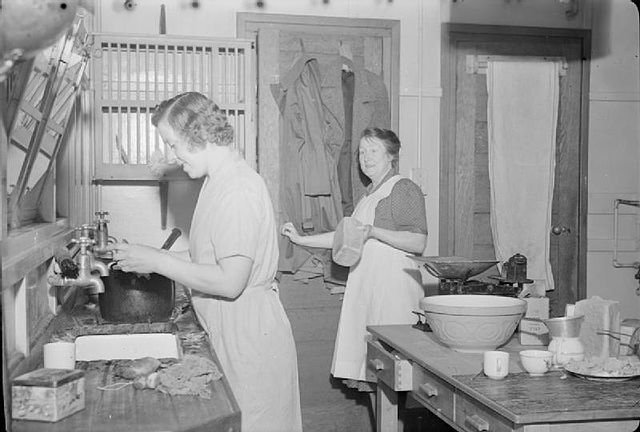Recording mum's stories and memories
Why we should all record our mums’ stories and memories
Ask your mum about her story, her life story, I guarantee you will be surprised. Saying that everyone’s story is unique is as obvious as it gets, but recently I have been interviewing a lot of women and I want to encourage everyone to listen to their mum’s story and even better to record it for their families. Each time I hear a new story, I am struck by the momentous changes that have occurred in my storytellers’ lifetimes around their everyday lives as well as the opportunities and restrictions that have been placed on girls and women.
Memories of Life at Home
“My mother would go shopping every single morning and each evening we would go to the market to get some fish.' So began a description of Mary’s day-to-day life as a child in pre-war London, before she went on to tell me about the iceman, who would visit every few days with a huge block of ice that they would use to keep food cool before the advent of the fridge.
Mary remembered the public bathhouse. Without a bath at home, she would visit the bathhouse twice a week with her mum. Mary recalled watching the hard-working assistants swill out and fill the baths with hot water for each customer.
Chicken, as with many storytellers feature in the story, Mary recalled how her mother would prepare a chicken for dinner once a week, first cleaning it and then stuffing the neck before sewing it up with a few stitches. Mary also told us about her grandmother, who kept ducks in the pantry and who used to make cheese; the smell of which has put Mary off cheese for life!
Born in 1926, Mary grew up in London’s East End in a fairly typical working-class family. She recalled how hard her mother worked, “She was always either cooking or cleaning, all her life, she had to, there was no choice, there were no restaurants or cafes, you had to cook yourself.”
Her mother’s life had not always been a life of drudgery, Mary remembers stories she was told. “My mother was an exceptional swimmer, she swam for her school, and they said that she was mischievous, ‘a handful’. There is a story of her falling downstairs on account of the high heels she was wearing. My mother fell in love and married at 18. She encouraged me to wait ‘to live a little’ before getting married. So, I waited, until I was 26.”
Mary has many stories and recollections to share, her life is not particularly unusual, but it is of course unique. While we all know that life for girls and women in decades past was, in many ways, so different from today, it always fascinates, and surprises me to hear the individual stories and memories. This is why I am so pleased that her family will always be able to hear Mary recalling not only her stories but also a few of those from her mother and her grandmother; generations of women whose voices we rarely heard.
Because she has chosen to record her story, Mary’s family now knows something of the life of their ancestors; what they were like as people, how and where they lived, what they did, as well as their hopes and their dreams and can pass this on to generations to come.
Education and ambition
During our conversation, one question that seemed to perplex Mary concerned her ambitions. “Ambitions she said, I didn’t have ambitions, well, just to marry and have children, I suppose.”
Many, many, many of the women I have interviewed have shared similar stories, not just of thwarted ambition, but a total lack of opportunity for all but the boldest of young women. Teaching, nursing, or secretarial work was the choice of the majority of women from only a generation or so ago.
Mary’s education was fairly disrupted by the second world war, and at 15 she started working as a dressmaker making 10 shillings a week, she told me, that like many other girls of her generation, she would give her wages to her mother, to save for her wedding.
Another member Helene spoke about her education and ambitions.“I wanted to be a teacher”, she said, “but my father wouldn’t let me, I had to work in his shop, I never became a teacher.”
Hilary’s ambitions were also thwarted by her father. Hilary was a bright and keen student who enjoyed school. Her Headmistress saw potential in her and asked if she would like to be tutored for Oxford or Cambridge, however, Hilary knew that while she was desperate for such an opportunity this was not her decision to make, it was her father who would decide on Hilary’s future.
Hilary recalls standing, shaking outside the Headmistress’s office, hearing her father say that he would not allow his daughter to go to University. It was not suitable.
Many years later, Hilary was in a position to make her own decisions and chose to study for her degree. She recalled how hard that was as by now Hilary was working full time and had a young family to look after. But, she said, that wasn’t the hard bit. \ The struggle was with the negative reactions from family and friends who believed that she should be looking after her family rather than studying.
When I hear stories like this, I think how lucky we are with the choices we now have. I also know that to hear about life and lives past in stories from our own mothers and grandmothers is very very powerful.
If you can, record your mother's story if you can’t then just listen, or contact me alice@thestorykeepers.co.uk and I can help.






